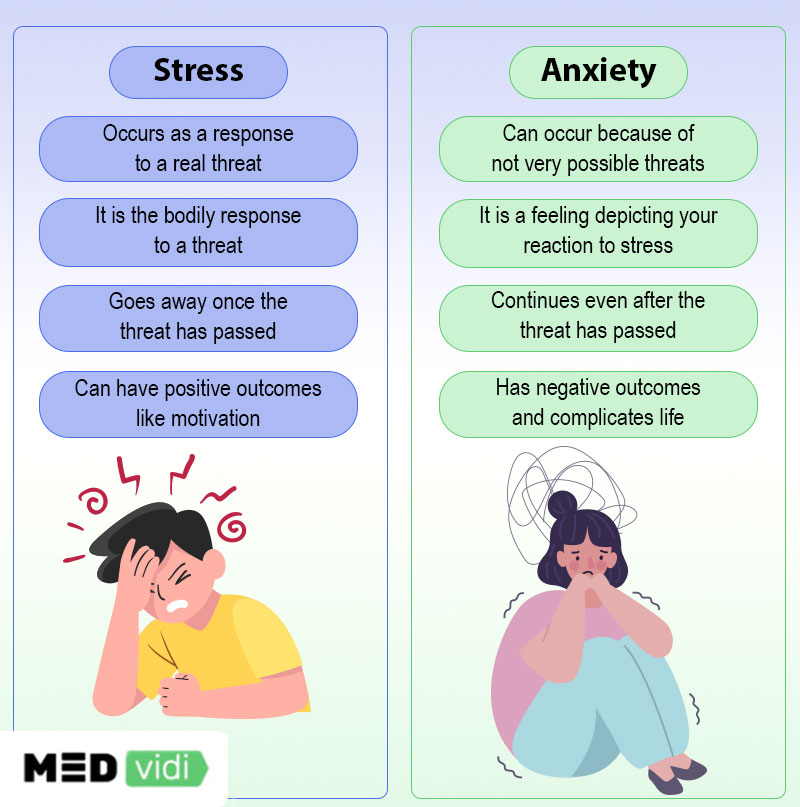Most people use the terms
Even though these two conditions have many similarities, they have significant differences too. To understand the difference between anxiety and stress, let’s start by defining each term.
MEDvidi doctors can help you manage anxiety effectively. Get help online.
What is Stress
Stress is the mental way of responding to external attacks, threats, or challenges. It can be a one-time problem, such as having too much work. Or a recurrent situation, such as dealing with long-term illness. Everyone experiences stress at some point but to different degrees. Types of stress include:
- Acute stress. It’s a short-term stress that comes when you’re in immediate danger. An example is when you narrowly escape a car accident.
- Chronic stress. It’s stress that stays for a long time, resulting from a continuous challenge, such as a chronic illness or a difficult job.
- Traumatic stress. It comes from negative life experiences, such as physical assault or natural disasters like tornadoes.
When under stress, the body releases adrenaline, the fight-or-flight hormone, which gives you the energy to face danger. This hormone increases your heart rate, making you sweat. In addition, the body releases the
Some levels of stress may be healthy. For instance, if you’re stressed about an upcoming test, you can study more, and it boosts your probability of passing. That said, chronic stress can be harmful. It can lead to physical pain (like headaches and muscle tension), fatigue, and mental and emotional issues.
What is Anxiety
Anxiety is characterized by having fear or worry about a perceived threat. A person with anxiety feels unease as they anticipate a future event, which may be stressful or overwhelming. Though anxiety is normal, it can get out of hand. Like stress, anxiety can also be chronic or clinical. At this level, a person experiences too much worry disproportionate to the perceived threat.
About
Anxiety can disrupt your usual life. Get help to overcome constant worrying and other symptoms.
What is the Difference Between Stress and Anxiety
How do you know whether you have stress or anxiety? Differentiating stress from anxiety involves comprehending their
- Stress occurs when there’s a real threat that may be happening or about to happen. Anxiety can result from perceived threats whose occurrence is uncertain.
- Stress is how the body responds to external threats, while anxiety is an internal feeling based on how you react to stress.
- Stress goes away once the threat has passed, but anxiety continues to exist even after that.
- Stress can have positive outcomes, like motivating you to work harder to meet your deadline. Anxiety has negative outcomes that complicate one’s life.

Treatment of Stress Vs. Anxiety
Most people can manage anxiety and stress without seeking treatment. But sometimes, these conditions can be severe and persistent to the point of disrupting daily life. At that point, they become mental disorders, and controlling them without professional help can be challenging.
If stress causes muscle tension, massage can help relax the tightness and reduce soreness. It can also improve circulation and lower blood pressure. Besides professional treatment, you can also try coping mechanisms on your own. These include:
- Taking a few minutes to breathe deeply to calm the nerves.
- Engaging in activities that you enjoy and trying to live in the moment instead of thinking about your problems.
- Sharing your feelings with a trusted person.
- Exercising regularly to trigger the production of endorphins, a brain neurotransmitter that increases your happiness.
- Living a balanced life with specific time to work, rest, and socialize.
- Keeping a journal to track your symptoms, identify triggers, and set priorities.
See a mental health expert to get the most suitable treatment for anxiety or prolonged stress.
Bottom Line
Most people confuse anxiety vs. stress because of similarities in symptoms and causes. The key difference between the two is that stress is a body’s response to external threats and is highly rational. And anxiety is how you react to stress. It’s based on perceived threats and often leads to exaggerated or irrational fear.
If you experience stress or anxiety that affects daily functioning, seek professional help. Failure to seek treatment can lead to complications like depression and other mental disorders. The best treatment for stress and anxiety is counseling because it has long-term benefits with zero side effects. But if there’s physical pain or severe mental symptoms, medication can help to provide instant relief.












